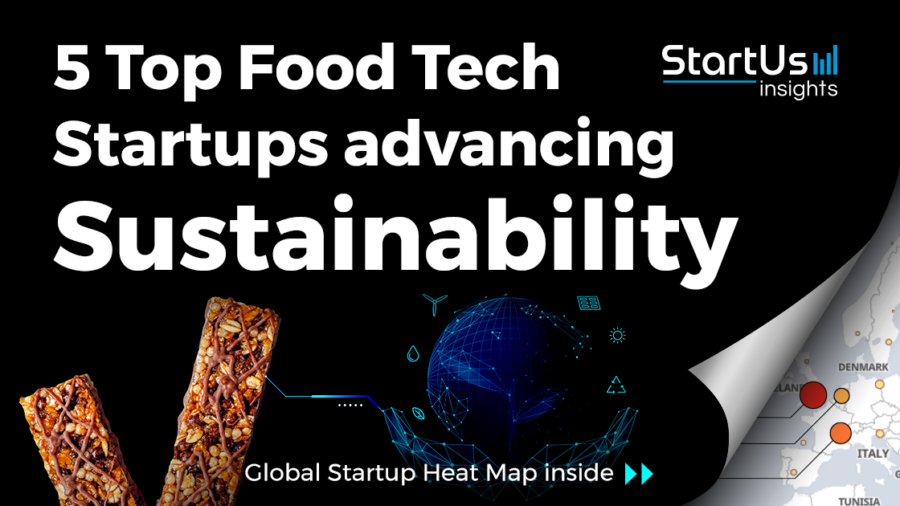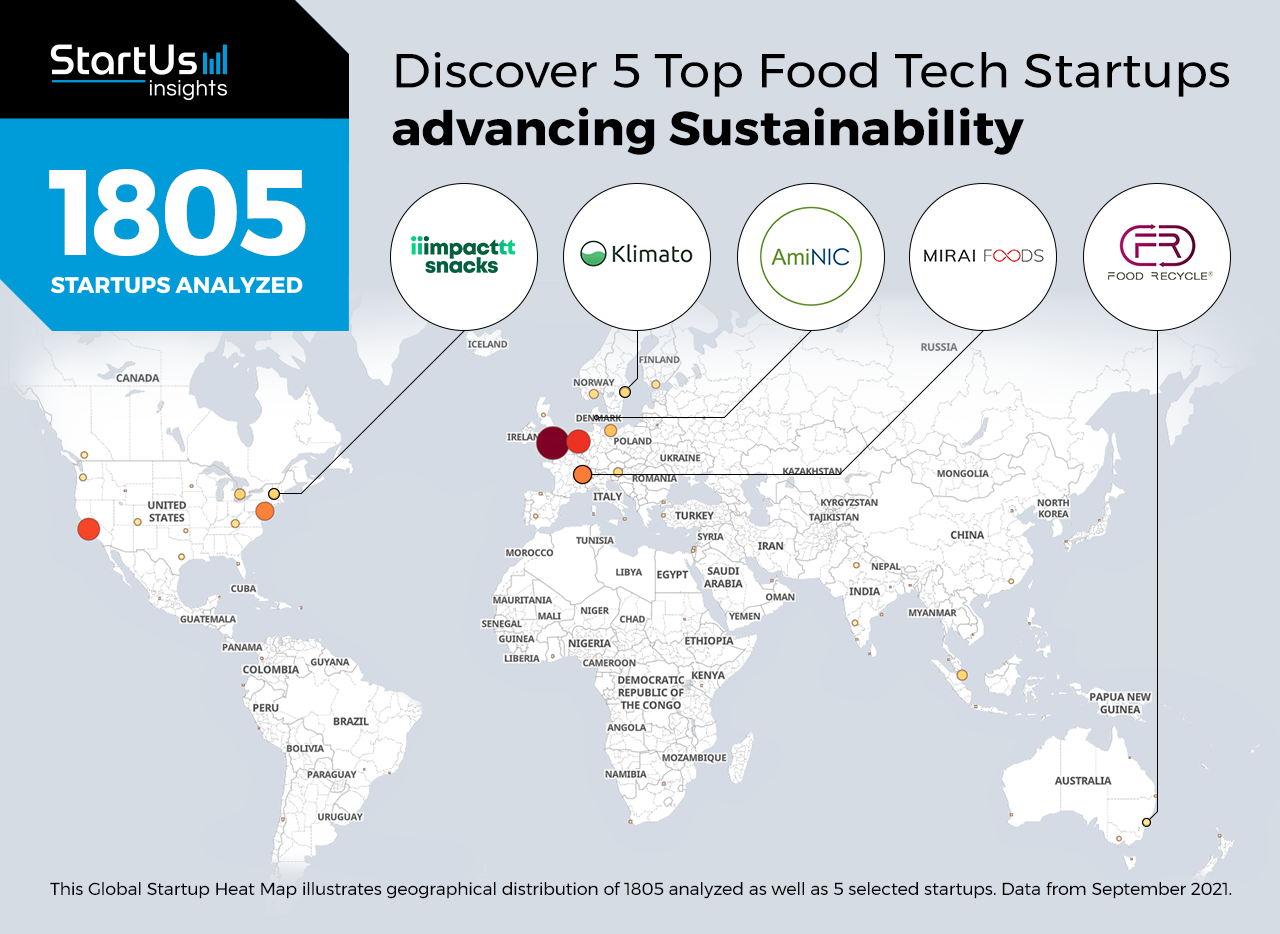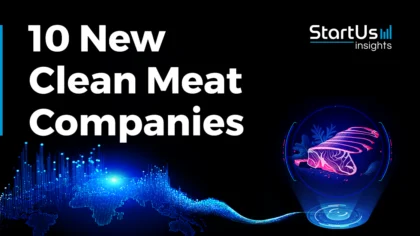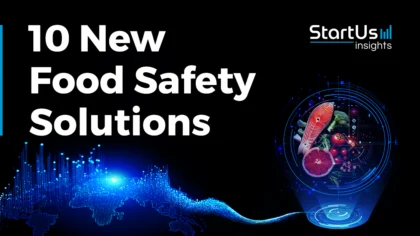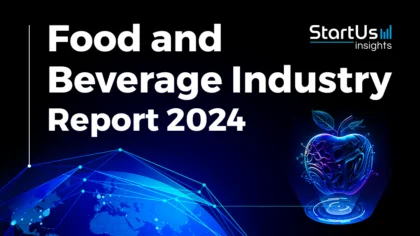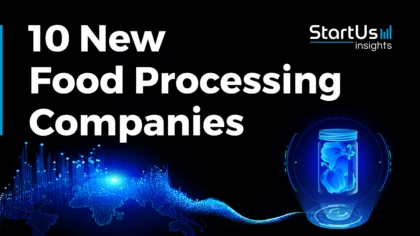Staying ahead of the technology curve means strengthening your competitive advantage. That is why we give you data-driven innovation insights into the food industry. This time, you get to discover 5 hand-picked food tech startups advancing sustainability.
Out of 1 805, the Global Startup Heat Map highlights 5 Top Food Tech Startups advancing Sustainability
The insights of this data-driven analysis are derived from the Big Data & Artificial Intelligence-powered StartUs Insights Discovery Platform, covering 2 093 000+ startups & scaleups globally. The platform gives you an exhaustive overview of emerging technologies & relevant startups within a specific field in just a few clicks.
The Global Startup Heat Map below reveals the distribution of the 1 805 exemplary startups & scaleups we analyzed for this research. Further, it highlights 5 food tech startups that we hand-picked based on criteria such as founding year, location, funding raised, and more. You get to explore the solutions of these 5 startups & scaleups in this report. For insights on the other 1 800 sustainability solutions for food, get in touch.
MIRAI FOODS offers Cultured Beef
Food production accounts for a quarter of global greenhouse gas (GHG) emissions, with beef as the major contributor. Cattle feeding requires large areas and overgrazing causes deforestation. Their digestion process also releases significant quantities of methane. Besides, farmers use chemical fertilizers that release carbon and nitrous oxide (N2O). To overcome these challenges, startups develop solutions that do not require cattle rearing processes for meat production.
Swiss startup MIRAI FOODS cultivates beef and meat from animal cells. The startup extracts sample cow tissues through biopsies or from a fresh piece of meat and isolates the best muscle and fat stem cells for bioprocessing. The stem cells proliferate in bioreactors with optimal conditions and nutrients. The startup harvests the multiplied stem cell biomass and puts them on a scaffold for muscle and fat stimulation. At last, mature muscle and fat cells from the scaffold are combined to provide raw beef similar to the actual grown. The startup, thereby, accelerates the transition to a global food system that is environmentally, ethically, and economically sustainable.
AmiNIC enables Food Expiry Date Prediction
Food waste results in energy and resource waste, and also contributes to global GHG emissions. Further, the food disposed of in landfills produces methane. Each year, a large amount of fresh food is trashed due to incorrect expiry dates. But, this problem is solved using intelligent sensors that predict food freshness levels and estimate expiry dates in real-time. Startups use the Internet of Things (IoT) and artificial intelligence (AI) along with food sensors to avoid premature food disposal. This allows retail companies to prevent financial loss due to food waste and reduce carbon footprint.
AmiNIC is a Danish startup that builds food sensors to reduce carbon footprint due to meat and fish wastage. Their handheld device consists of a micro-cantilever induced with a chemical binder that is sensitive to ultra-small concentrations of the gas cadaverine. The nanotechnology solution detects the emission levels of gases from the food and generates electrical signals to display the freshness. The sensors then instantly predict the expiration dates of fish and meat. This enables retailers to reduces carbon emissions by preventing food wastage due to insufficient expiry information.
Impact Snacks provides Carbon-Neutral Snacks
As the snackification trend grows, it generates a huge amount of carbon dioxide in terms of plastic production and waste. Carbon-neutral snacks solve this problem by providing consumers with healthy and sustainable snacking alternatives. Startups manufacture plant-based snacks which have a lower carbon footprint than meat-based snack options. Such products also allow food companies to avail credits for manufacturing carbon-negative products.
US-based startup Impact Snacks utilizes plant-based ingredients to produce snacking bars. The startup uses superfoods like lion’s mane, maca root, kale, coconut, peas, and almonds, among others that are natural, gluten-free, and dairy-free. The snacking bars provide the required nutrition while causing less damage to the environment. Moreover, the startup creates wrappers from bio-cellulose derived from soy, which is biodegradable and compostable. The company keeps carbon accountants to determine emissions at each step and claims them back by developing green energy infrastructures and planting trees. The startup also allows consumers to track their impact on the environment with sustainable snacking bars and green initiatives.
Klimato builds Carbon Tracking Software
Every food product goes through several stages during production, including raw material extraction or farming, factory processing, and transportation. All these stages release GHG emissions to the air, soil, and water. Although customer preference is shifting towards climate-friendly meals, it remains difficult for restaurants to calculate and visualize their environmental impact. But, technology solves this problem by offering online platforms to track the carbon footprint. This allows restaurants to update their customers with the impact they create with every meal.
Swedish startup Klimato develops web-based applications for restaurants to track their carbon emissions. The startup’s tool Klimato allows restaurant owners to calculate the climate impact of the meals they serve based on the types of ingredients, production method, and country of origin. Restaurants put labels on the menu cards beside each food item to share the dish’s carbon impact data with consumers. Further, the tool assists restaurants to set monthly sustainability goals, track them and send reports to the customers as well as offers various offset programs to compensate for the emissions.
Food Recycle advances Food Waste Upcycling
Food waste in landfills decays to produce higher quantities of methane and carbon dioxide emissions. Moreover, food waste is an additional cost to a company’s economy and causes biosecurity threats due to the decaying process. On the other hand, recycling food waste reduces greenhouse emissions and produces higher value products with a lower carbon footprint. Further, it lowers the production cost of the new product while making the product more sustainable. Hence, startups upcycle food waste to reduce the carbon footprint of food companies, as well as generate financial value out of waste.
Food Recycle is an Australian startup that upcycles food waste into animal feed. The startup uses a five-step process to recycle almost ten tonnes of waste each day and convert it into poultry feeds and liquid fertilizers with distilled water as a by-product. The procedure includes heat treatment, dewatering, dehydration, blending, and pelletizing waste. The solution provides producers with thrice the value of commercial compost while meeting zero emissions. It also mitigates the sustainability and biosecurity threats associated with waste and compost.
Discover more Food Tech Startups
Food startups such as the examples highlighted in this report focus on alternative proteins, sustainable nutrition, and circular economy. While all of these technologies play a major role in advancing the food industry, they only represent the tip of the iceberg. To explore more food technologies, simply get in touch to let us look into your areas of interest. For a more general overview, you can download our free FoodTech Innovation Report to save your time and improve strategic decision-making.
